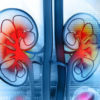 Lactose Intolerance Care in Northern New Jersey
Lactose Intolerance Care in Northern New Jersey
A patient who is lactose intolerant may find that certain foods bother their stomach or make them feel bloated. Lactose intolerance is common, affecting about 65% of the population. The internal medicine physicians at Bergen Medical Associates treat patients in northern New Jersey and the surrounding area, providing comprehensive care for lactose intolerance and many other conditions.
What Is Lactose Intolerance?
Lactose intolerance is the inability or impaired ability to digest lactose, a form of sugar commonly found in dairy products. An enzyme called lactase, which is produced in the small intestine, breaks down lactose. When the body doesn’t produce enough lactase, it becomes difficult for a person to digest foods that contain lactose.
Reduced production of lactase after infancy is common, and many patients are diagnosed with lactose intolerance as teenagers or adults. Congenital lactase deficiency, a condition in which infants cannot break down the lactose in breast milk or formula, is much rarer.
What Are the Symptoms of Lactose Intolerance?
The onset of symptoms usually occurs about half an hour to two hours after consuming foods high in lactose, such as milk, sour cream, or ice cream. Symptoms can include:
- Abdominal cramps
- Bloating
- Diarrhea
- Gas
- Nausea
What Are the Risk Factors for Lactose Intolerance?
Lactose intolerance can affect patients of all ages. Risk factors include:
- Genetics: Lactose intolerance runs in families.
- Ethnicity: Lactose intolerance is more common in patients who are African American, Native American, Asian, or Latino.
- Other medical conditions: Patients with digestive diseases such as ulcerative colitis, Crohn’s disease, and celiac disease may produce less lactase.
How Is Lactose Intolerance Diagnosed?
If an internist suspects a patient is lactose intolerant, they often will have the patient avoid dairy products for up to two weeks to see if symptoms subside. Additionally, they may use the following diagnostic tests:
Hydrogen Breath Test
This test measures the levels of hydrogen in a patient’s breath. If their digestive system doesn’t break down lactose, hydrogen will rise.
Lactose Tolerance Test
After fasting, a patient will drink a liquid containing lactose. Their provider will then take blood samples to test the patient’s blood glucose levels over a couple of hours. If their blood sugar does not rise, the digestive system is not absorbing lactose, indicating they may be lactose intolerant.
What Treatments Are Available for Lactose Intolerance?
Unfortunately, there is no treatment to make the body produce more lactase. However, lactose intolerance can be managed with dietary changes. In general, avoiding foods that are high in lactose can significantly reduce symptoms such as gas, bloating, and diarrhea. Taking a lactase supplement before consuming milk or dairy products also can help minimize symptoms.
Not everyone is triggered by the same foods, so some trial and error are required to find the right diet. For example, some patients can tolerate yogurt and hard cheeses that have lower amounts of lactose than other dairy products. Others can tolerate lactose only in small amounts. For example, they might not be bothered by a sandwich with cheese but will have symptoms if they drink a milkshake.
Patients with lactose intolerance also should read food labels carefully when shopping, as packaged foods such as cookies, chips, and baking mixes often have added lactose. Non-dairy replacements, such as almond or soy milk, are widely available.
Maintaining a Balanced Diet
Understandably, some patients worry that eliminating milk and dairy products will mean they are not getting enough calcium. Fortunately, there are plenty of other calcium-rich foods that do not contain lactose, such as:
- Broccoli
- Sardines
- Spinach
- Tofu
Some foods, such as almond milk, orange juice, and breakfast cereals, are fortified with calcium. Lactose-intolerant patients may be referred to a dietitian if they need nutrition advice and guidance.
Find Care You Can Trust at Bergen Medical Associates
Individuals in northern New Jersey and the surrounding areas will find comprehensive, patient-centered care at Bergen Medical Associates. With an experienced team of primary care physicians and specialists, Bergen Medical Associates has multiple convenient locations so patients can receive care close to home. For more information, request an appointment today.










